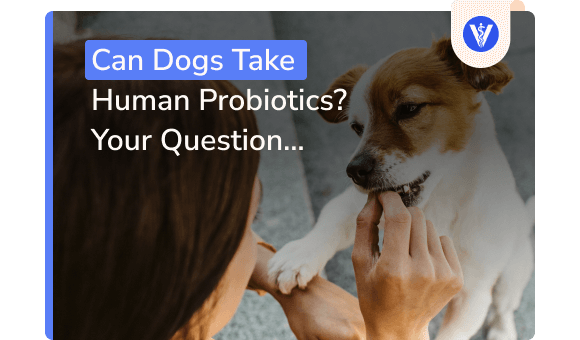Is it Safe to Use Human Probiotics for Dogs? The Complete Answer to Your Question


Is it Safe to Use Human Probiotics for Dogs? The Complete Answer to Your Question
Table of Contents
Can Dogs Take Human Probiotics?
Yes, dogs can take human probiotics as long as they do not contain ingredients that are dangerous to dogs. However, when it comes to human probiotics for dogs, they are not as effective as dog probiotics.
Probiotics are beneficial bacteria that help maintain a healthy gut and GI tract. They can help with health issues like constipation, diarrhea, bloating, obesity, and bad breath.
Other benefits of probiotics for dogs also include adequate digestive tract function, strengthened immune system, and reduced stress.
To ensure these benefits, your dog needs the right probiotic. Supporting gut health and preventing digestive issues is harder if using human probiotics for dogs instead of dog probiotics.
Are Human Probiotics the Same as Dog Probiotics?
No, human probiotics for dogs are not the same as dog probiotics.
The main differences between human and dog probiotics are the type of bacteria and the number of live bacteria. This is becuase the dog’s gut bacteria is different than the human’s.
Specific probiotics or bacterial strains are present in both dogs and humans. However, they will be present in much higher numbers (colony forming units – CFU) in the human supplement than they would be in dog probiotics.
Another difference is in the added ingredients. Namely, human probiotics often feature ingredients that are harmful to dogs. Human supplements may contain xylitol – an artificial sweetener that is toxic to dogs.
What’s the Difference Between Human-Grade Probiotics and Human Probiotics for Dogs?
Human-grade probiotics are dog probiotics made with high-quality ingredients or ingredients that pass all the requirements for human consumption. Generally speaking, the best probiotics for dogs are made with human-grade ingredients.
On the other hand, human probiotics are supplements formulated explicitly for humans. They have good bacteria that are specific to the human GI tract and digestive health.
In simple words, the main difference between human-grade probiotics and human probiotics is in the type of probiotics (healthy microbes) within the supplement.
What Human Probiotics are Safe for Dogs?
The human probiotics for dogs that are safe are Lactobacillus acidophilus. This beneficial bacteria helps soothe GI upsets, increases nutrient absorption, and supports the production of B-complex vitamins. It can also alleviate dermatitis symptoms.
Lactobacillus acidophilus is a great staple for human and canine probiotics. Plus, L. acidophilus is almost indestructible when traveling through the dog’s digestive tract. Therefore, you do not have to worry about the digestive enzymes damaging the bacteria.
However, before you give your dog a human probiotic with L. acidophilus, you need to make sure there are no potentially harmful ingredients in the supplement.
You can give your dog some human foods that are rich in natural probiotics. For example, you can enrich your dog’s diet with kefir, kombucha, kimchi, and yogurt. You can also mix a few ingredients and prepare homemade probiotics for your dog.
Homemade human probiotics for dogs usually include ingredients that are rich in probiotics and prebiotics (dietary fiber). Prebiotics serve as a food source for the good microorganisms in the dog’s digestive system. Studies show that when used together, these supplements boost each other’s effects.
What Happens if a Dog Eats Human Probiotics?
The answer depends on the exact scenario.
For example, if a healthy dog eats human probiotics with no harmful ingredients, it will be fine. If the number of live cultures was too high, it may experience transient stomach upset – diarrhea and bloating.
However, if a dog eats human probiotic supplements with a potentially hazardous ingredient such as xylitol, it will become intoxicated. Xylitol poisoning in dogs is life-threatening.
So, the consequences of using human probiotics for dogs range from transient stomach upset to severe intoxication. Therefore, before using human probiotics for dogs, or in the case of accidental ingestion, it is important to talk to a veterinarian.
The vet will confirm whether it is safe to use human probiotics for dogs or if the ingestion already occurred whether you need to take your dog for evaluation.
Why Do Dogs Need Their Own Probiotics?
Dogs need their own probiotics because they are safer and more efficient. Here is a closer review of the main reasons human probiotics for dogs are not the best idea:
- Specific Strains of Bacteria. As explained the dog’s microbiome is different than the human’s and requires different probiotic strains. In addition to the mutually beneficial L. acidophilus, the dog probiotic would contain:
- Bacillus coagulans. This bacterium promotes GI tract health and helps with issues such as inflammatory bowel disease (IBD) and irritable bowel syndrome (IBS).
- Bifidobacterium animalis. B. animalis supports healthy digestion and nutrient absorption. It is also useful for dogs after prolonged use of antibiotics.
- Saccharomyces boulardii. This good yeast boosts the dog’s immune system and helps manage intestinal damage caused by pathogens.
- Enterococcus faecium. E faecium has a strong immunomodulatory effect. It is also very helpful in the management of stress-triggered diarrhea.
- Adequate CFUs. Human probiotics contain a high number of live bacteria. This can make the good bacteria in the dog’s gut compete with each other. As a result, the population of harmful bacteria may spike and cause issues.
- Correct pH Balance. The stomach’s pH level in dogs is lower than in humans, meaning it is much more acidic. This defense mechanism protects dogs from harmful bacteria they often encounter due to poor sanitary habits (butt licking, dirt sniffing). The acids and digestive enzymes in the dog’s gut can easily destroy human probiotic strains before they exert any benefits.
- Form and Flavor of the Supplement. Probiotic supplements for dogs come in forms (chews, liquids, and powders) that are easy to give to dogs. Plus, dog probiotics feature flavors like chicken, beef, or bacon. The dog-friendly form and flavor make the use of pet probiotics much easier.